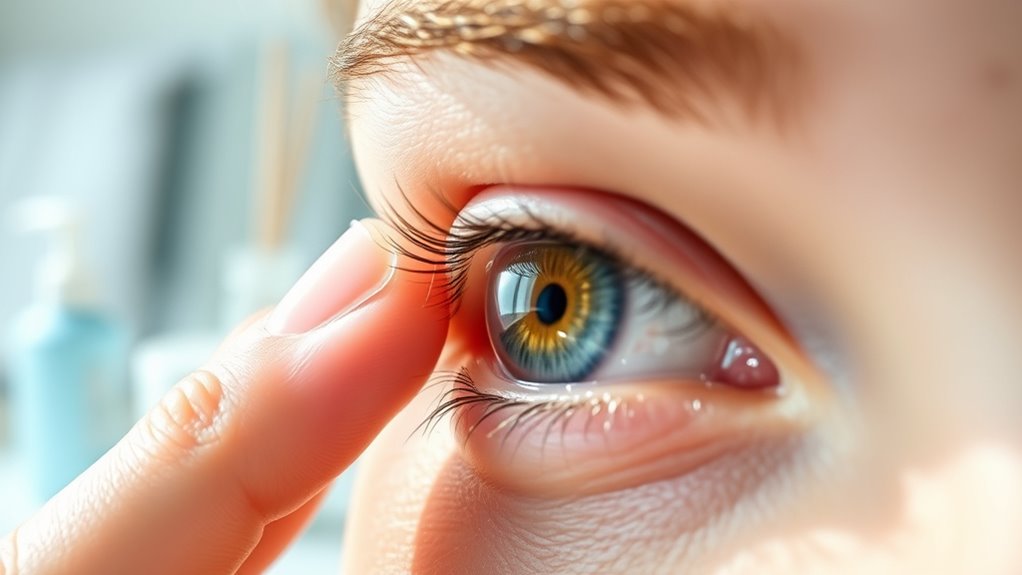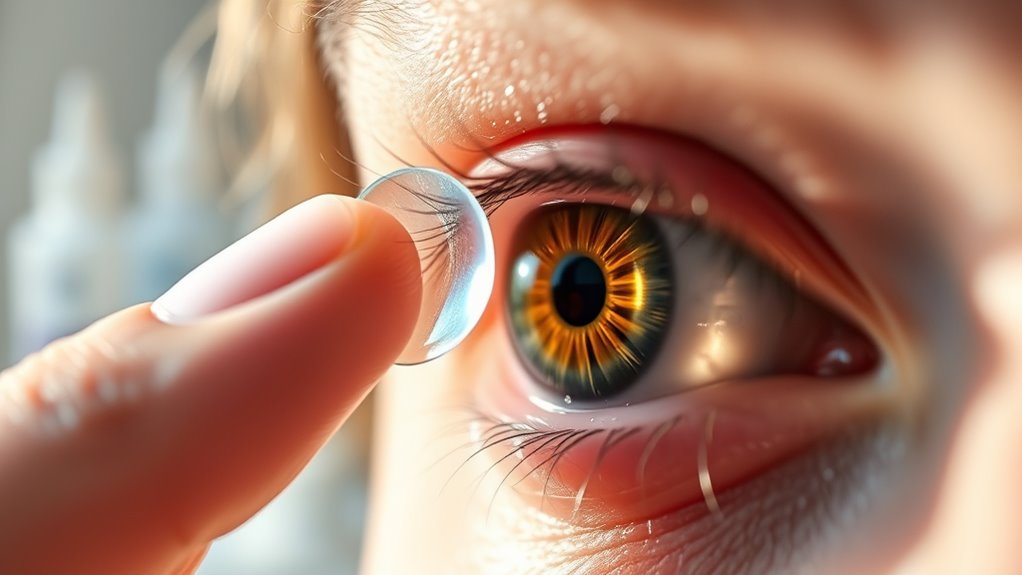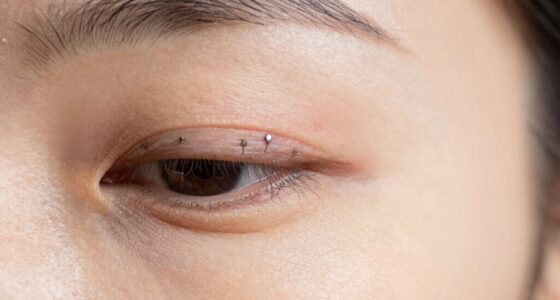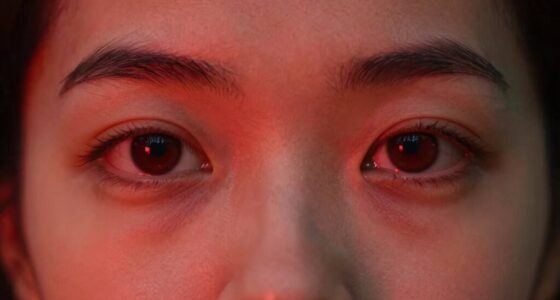To avoid irritation and dryness as a contact lens wearer, you should practice excellent hygiene by washing your hands before handling lenses, using recommended cleaning solutions, and regularly replacing your lens case. Manage environmental and allergy triggers by keeping your space clean, avoiding dusty or pollen-heavy areas, and using allergy-friendly eye drops if needed. For added comfort, use rewetting drops and take breaks from wearing your lenses. Continuing on will help you discover more ways to keep your eyes healthy and comfortable.
Key Takeaways
- Wash hands thoroughly before handling lenses to prevent introducing irritants or microbes.
- Use recommended rewetting drops suitable for contact lens wear to alleviate dryness.
- Remove lenses during high pollen or dusty conditions to reduce irritation risk.
- Regularly replace contact lens cases and clean them with fresh solution to prevent microbial buildup.
- Follow eye care professional’s guidance on lens use and allergy management for optimal comfort.

Wearing contact lenses offers convenience and clear vision, but it also requires proper eye care to prevent infections and discomfort. One of the most important aspects of maintaining healthy eyes while wearing contacts is practicing good contact lens hygiene. This means thoroughly washing your hands before handling your lenses, using the recommended cleaning solutions, and avoiding touching your eyes with dirty fingers. Proper hygiene minimizes the risk of bacteria, fungi, and other pathogens that can cause infections like keratitis or conjunctivitis. Regularly replacing your contact lens case is equally essential, as a neglected case can harbor harmful microbes. Make sure to clean it with fresh solution and allow it to air dry completely between uses. Following your eye care professional‘s instructions on cleaning and storage routines helps ensure your lenses stay clean and safe to wear. Additionally, understanding the optical properties of your lenses can help you select the best type for your needs and reduce discomfort.
Allergy management is another critical component of preventing eye irritation and dryness. Many contact lens wearers develop sensitivities to environmental allergens like pollen, dust, or pet dander, which can cause redness, itching, and watery eyes. During allergy seasons or when exposed to known triggers, consider using allergy eye drops that are compatible with contact lenses, but always consult your eye care provider first. Avoid wearing lenses during high pollen counts or dusty environments if possible, and try to keep your living space clean to reduce allergen exposure. If you notice increased irritation or dryness, it might be helpful to switch to daily disposable lenses, which reduce buildup of allergens and protein deposits. Proper allergy management not only alleviates discomfort but also lowers the chances of developing more serious eye problems caused by ongoing irritation.
Beyond hygiene and allergy management, staying aware of how your eyes feel is essential. If you experience persistent dryness, consider using rewetting drops designed for contact lens wearers. These drops can lubricate your eyes and improve comfort throughout the day. Avoid using regular eye drops not formulated for contact lenses, as they may contain ingredients that can damage your lenses or cause further irritation. Additionally, giving your eyes regular breaks from lenses, especially if you’re experiencing discomfort, can help reduce dryness and prevent strain. Remember, your eyes are sensitive, and paying close attention to their health is key to enjoying clear, comfortable vision with contact lenses. By maintaining strict hygiene routines, managing allergies effectively, and listening to your eyes’ needs, you can avoid irritation and dryness while enjoying the benefits of contact lens wear.
Frequently Asked Questions
Can Contact Lenses Cause Long-Term Eye Damage?
You might wonder if contact lenses can cause long-term eye damage. While most modern lenses made from safe contact lens materials are designed to protect eye health, improper use or poor hygiene can lead to complications. Over time, poor eye care may cause issues like corneal damage or infections. To prevent this, follow your eye care provider’s advice, choose the right lens material, and maintain good hygiene to keep your eyes healthy.
Are There Specific Eye Drops Safe for Contact Lens Wearers?
Ever wonder which eye drops are safe for you? Not all are compatible with contact lenses, so choosing the right ones is essential. Look for eye drops labeled as “contact lens compatible” or “safe eye drops” specifically designed for lens wearers. These help prevent irritation and dryness without compromising your lenses. Always check with your eye care professional before trying new drops to make sure they’re suitable for your eye health.
How Often Should I Update My Contact Lens Prescription?
You should update your contact lens prescription regularly to guarantee ideal vision and comfort. Follow your eye care professional’s recommended prescription renewal schedule, typically every year or as advised. Regular check-ups help identify any changes in your vision or eye health, reducing irritation or dryness caused by outdated prescriptions. Don’t delay your lens replacement or prescription updates, as this keeps your eyes healthy and ensures clear, comfortable wear.
What Foods Can Improve My Eye Hydration?
Imagine you’re in a 1920s speakeasy, sipping on a glass of water. Proper eye hydration is essential for your eye health, and certain foods can boost it. Foods rich in omega-3s, like salmon and walnuts, offer great benefits for your eyes. Leafy greens, such as spinach, also help maintain moisture. Incorporate these into your diet to support your eye hydration and keep your vision clear and comfortable.
Can Dry Eyes Be Cured Permanently?
Dry eyes can sometimes be managed, but a permanent cure depends on the causes. You should understand dry eye causes like aging, medication, or underlying health issues. While treatments like artificial tears or lifestyle changes can help, they might not provide a permanent treatment. Consult an eye care professional to identify the root cause and explore options for long-term relief, but complete permanent cure isn’t always guaranteed.
Conclusion
Taking good care of your contact lenses is key to avoiding irritation and dryness. Remember to follow proper hygiene, replace lenses as recommended, and use appropriate eye drops if needed. Did you know that over 90% of contact lens-related issues can be prevented with proper care? By staying vigilant and attentive to your eye health, you can enjoy clear, comfortable vision every day. Protect your eyes and keep your contact lens routine simple and safe.









